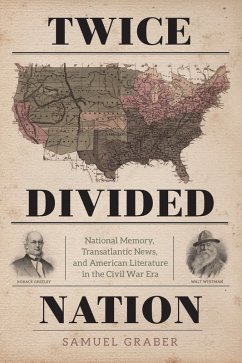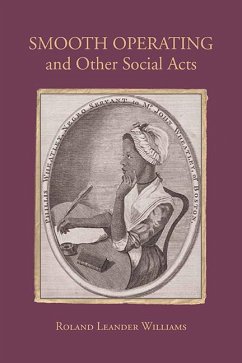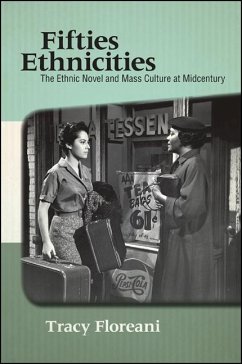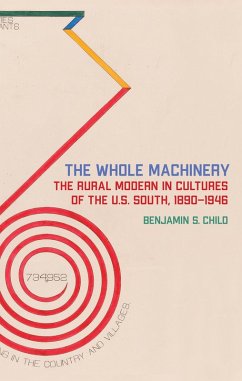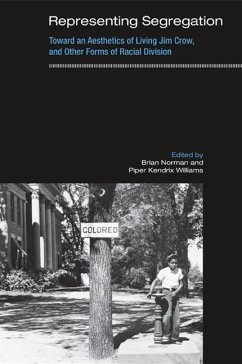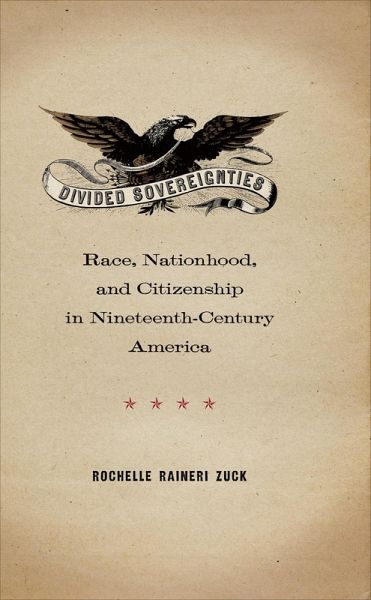
Divided Sovereignties (eBook, ePUB)
Race, Nationhood, and Citizenship in Nineteenth-Century America
Versandkostenfrei!
Sofort per Download lieferbar
43,95 €
inkl. MwSt.
Weitere Ausgaben:

PAYBACK Punkte
22 °P sammeln!
In eighteenth- and nineteenth-century debates about the constructions of American nationhood and national citizenship, the frequently invoked concept of divided sovereignty signified the division of power between state and federal authorities and/or the possibility of one nation residing within the geopolitical boundaries of another. Political and social realities of the nineteenth century-such as immigration, slavery, westward expansion, Indigenous treaties, and financial panics-amplified anxieties about threats to national/state sovereignty.Rochelle Raineri Zuck argues that, in the decades b...
In eighteenth- and nineteenth-century debates about the constructions of American nationhood and national citizenship, the frequently invoked concept of divided sovereignty signified the division of power between state and federal authorities and/or the possibility of one nation residing within the geopolitical boundaries of another. Political and social realities of the nineteenth century-such as immigration, slavery, westward expansion, Indigenous treaties, and financial panics-amplified anxieties about threats to national/state sovereignty.
Rochelle Raineri Zuck argues that, in the decades between the ratification of the Constitution and the publication of Sutton Griggs's novel Imperium in Imperio in 1899, four populations were most often referred to as racial and ethnic nations within the nation: the Cherokees, African Americans, Irish Americans, and Chinese immigrants. Writers and orators from these groups engaged the concept of divided sovereignty to assert alternative visions of sovereignty and collective allegiance (not just ethnic or racial identity), to gain political traction, and to complicate existing formations of nationhood and citizenship. Their stories intersected with issues that dominated nineteenth-century public argument and contributed to the Civil War.
In five chapters focused on these groups, Zuck reveals how constructions of sovereignty shed light on a host of concerns including regional and sectional tensions; territorial expansion and jurisdiction; economic uncertainty; racial, ethnic, and religious differences; international relations; immigration; and arguments about personhood, citizenship, and nationhood.
Rochelle Raineri Zuck argues that, in the decades between the ratification of the Constitution and the publication of Sutton Griggs's novel Imperium in Imperio in 1899, four populations were most often referred to as racial and ethnic nations within the nation: the Cherokees, African Americans, Irish Americans, and Chinese immigrants. Writers and orators from these groups engaged the concept of divided sovereignty to assert alternative visions of sovereignty and collective allegiance (not just ethnic or racial identity), to gain political traction, and to complicate existing formations of nationhood and citizenship. Their stories intersected with issues that dominated nineteenth-century public argument and contributed to the Civil War.
In five chapters focused on these groups, Zuck reveals how constructions of sovereignty shed light on a host of concerns including regional and sectional tensions; territorial expansion and jurisdiction; economic uncertainty; racial, ethnic, and religious differences; international relations; immigration; and arguments about personhood, citizenship, and nationhood.
Dieser Download kann aus rechtlichen Gründen nur mit Rechnungsadresse in A, D ausgeliefert werden.




